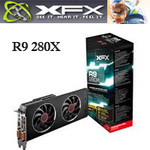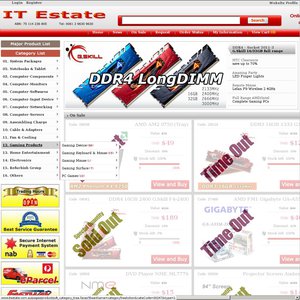I was just curious to see how much one of these new AMD cards are selling for and stumble across this site with free shipping using Fastway Couriers (might be a pricing error), but costs $12 for StarTrack Express. So technically it's a good deal if you consider that XFX is a reputable brand and express shipping as a bonus ;)
XFX AMD R9 280X 3GB Graphics Card for $359 Delivered Using Fastway Couriers (Express) NSW Only
Related Stores
closed Comments

Have things changed? XFX used to have one of the dodgiest warranties in Australia. Was great in the US however. Would love to hear experiences. Mind you i had an xfx card a long time ago that lasted forever, and would probably still work today.

Sad part is that their warranty is still very slow, even in the US it seems(as per Amazon reviews).

A XFX card of mine died 1 month out of warranty, they replaced it for me. I had to chat back and forth a lot and send the old card to them, but a new card out of warranty is a bloody good deal and customer service as I see it.

XFX might be reputable, but IT Estate might not be…

I bought alot of stuff from them a few years ago, had to RMA a Motherboard through them.
Service was excellent, emails were replied to really fast. From my previous experience i would recommend them over a lot of other online stores.

Note that these 'new' cards are the same as the 7970, so you can get a much better deal on old 7970 stock.

…Actually, this seems to be the only one of the rebranded R9s and R7s that's cheaper than the old part it replaces, take a look:
http://www.staticice.com.au/cgi-bin/search.cgi?q=hd+7970+Ghz…

Sure it's not bad, but there have been lots of 7970s going cheaper
http://www.ozbargain.com.au/search/node/7970
Maybe it's too late to get a good price on that though?

It replaces the "7970 Ghz Edition", a higher clocked card, not the vanilla 7970.
Technically speaking, it's the same chip, but one that passed more stringent tests in the factory, so AMD officially spec it for clocks 1Ghz or higher. In benchmarks it's quite a bit faster, enough that they distinguish it from the plain 7970.
Cheapest ever deals are something like:
7970: $299,
7970 Ghz Ed: $399,
R9 280x: $349.
It's really a matter of semantics though when it comes to the 7970/7970 GE/R9 280X. They're all 28nm lithography, all Tahiti derivatives, same amount of ROPS/TMUS/Shader Processors and when clocked at the same speeds they produce the same pixel fillrates, texture fillrates and memory bandwidth; the only difference is how reliably they perform at frequencies above 1Ghz and how much voltage they need to OC.
That being said though, this quote from Tom's Hardware suggests that AMD has basically extracted all it can from the Tahiti architecture and you won't find many 7970's/GE's or R9 280X's that are going to give you a lot of OC headroom:
Our Radeon HD 7970 GHz Edition cards aren’t any more capable than the original Radeon HD 7970 overclocked. In our opinion, you reach the best results at 1150 MHz using AMD’s own tools. Push any harder and you’ll find the card dropping frames (even if its average frame rates seem to suggest better performance).
http://www.tomshardware.com/reviews/radeon-hd-7970-ghz-editi…I've gotten to 1150Mhz/1500Mhz on my 7970 but can't push it to 1200Mhz on the core, given that it's factory OC'ed by a good margin out of the box from 925Mhz (whereas 7970 GE's can get there if their ASIC is good enough but they get hot, noisy and consume a lot more power).
I'm not sure the R9 280X's go through any different of a binning process than any other AMD chips; unless you're getting a vendor-backed, high ASIC core like the ASUS DirectCUII TOP editions.

'Maximum depth of comments is 4' So this isn't a reply to you directly Bruce but to those who replied to you.
This vid somewhat describes the 'binning' process well enough.
http://www.youtube.com/watch?v=B14BiB-Bv3sText summary of the vid: While all the chips are produced in exactly the same way, there are still variances in performance between them from the manufacturing process. Even chips from the same batch. So using the argument 'all the chips are made the same way so they must be the same' isn't as useful as it sounds at first blush.
So ones that are tested from the batch that run well are sold at a premium price, while those that test not so well get put into more value orientated products. However because depending on the variances, some chips hit benchmarks better than others. One such variance could be the chip produces more heat than the set targets for a performance tier product so they under-clock it and sell it as a value orientated product while still hitting all other benchmarks.
So you could get lucky and get that particular chip and slap on a better heat sink and overclock it to run the same speed as a performance tier product. But then again you might not get so lucky and get a chip that didn't make performance tier on other parameters and barely made it into the value tier product that wont be as great even after overclocking.
Paying extra for the performance tier products just ensures you're getting one that's already tested to meet those standards. You may get lucky and get a similar performing product by purchasing a cheaper item made in the same batch and then tweaking it. But then again you may not.

Also, keep in mind this is clocked at 850Mhz. Thats the main reason as to why I didn't get the XFX model

GPU Boost Clock : 1000MHz
GPU Bus (bit) : 384
GPU Clock : 850MHzI think most of them are like that.

Incorrect. Majority (atleast the brand name ones) are clocked at 1000Mhz. I have the OC Gigabyte version and it sits at 1050. 850Mhz is a little poor for such a great card.
Edit: Just for reference, even the HIS sits at 1000Mhz. Asus cards are >1000Mhz. I personally haven't had experience with XFX (although I've heard nothing but good things from them), I really believe for the extra $20, it's worthwhile getting a higher clocked card.

Great value high-end GPU. R9 280x is basically a rebranded 7970 Ghz Edition, and it beats the GTX 780 in some games:
http://www.anandtech.com/bench/product/827?vs=768Keep in mind the GTX 780 is still at least $599 here (I think this is after a price drop too, no?):
http://www.staticice.com.au/cgi-bin/search.cgi?q=GTX%20780&s…Looks like even the $1000 Titan is only 0% - 30% better:
http://www.anandtech.com/bench/product/764?vs=768So: This is an excellent value high-end GPU.
…but this isn't the cheapest R9 280x by much, PCCG (a more well known shop) has it for $349 plus postage:
http://www.pccasegear.com/index.php?main_page=product_info&c…And some others are close: http://www.staticice.com.au/cgi-bin/search.cgi?q=r9+280x&spo…

The 7970 GHz might beat the GTX 780 in some games, but realistically though the GTX 780 is a better card. Whether it's worth the $250 price premium, well that's up to the individual users.
Titan has been irrelevant for gaming ever since the GTX 780 came out.
The fairer comparison for this card is the GTX770, which is around $390 at the moment.

realistically though the GTX 780 is a better card
Why? In actual benchmarks, or just "theoretically"? (I'd imagine it overclocks better, but I have no sources for that).
I'm an Nvidia owner myself, but there's really no clear advantage to the 780 in actual game performance, looking at benchmarks, let alone one worth 250 extra dollars.
The fairer comparison for this card is the GTX770
Actually, Tom's Hardware puts the 770 in a lower tier, alongside the plain 7970:
http://www.tomshardware.com/reviews/gaming-graphics-card-rev…
Realistically means in most benchmarks. There are games where the 7970 GHz beats the GTX 780, but the 780 does manage to win most. http://anandtech.com/bench/product/827?vs=768
On top of that, the GTX 780 is very overclockable whereas the 7970 GHz is not really overclockable (because it's pretty much a factory overclocked 7970), so that gives the edge to the 780.

but realistically though the GTX 780 is a better card
Define "realistically".
The 7970 GE is technically the superior card since it's computational output beats the 780 (17.2 vs 15.9 GFLOPS); you can compare the LuxMark, CL Benchmark and AMP Benchmark scores here: http://www.anandtech.com/bench/product/768?vs=827.
The GTX 780 is highly overpriced for what it ultimately delivers, and doesn't manage any improvements in power consumption or heat dissipation either. The performance-per-dollar of the 7970 GE is something that hasn't been seen in a long time. The 780 costs 80% more but only manages to be 5-10% better in certain games (BF4 not being one of them).
Titan has been irrelevant for gaming ever since the GTX 780 came out.
How is being 20% faster irrelevant? It does cost roughly 50% more, but it is firmly above the 780.
http://hothardware.com/Reviews/NVIDIA-GeForce-GTX-780-Review…
http://hothardware.com/Reviews/NVIDIA-GeForce-GTX-780-Review…
I really like Nvidia but their latest generation, or even 2 generations of cards, whilst better, have not been worth the price.
Now that AMD have released their new generation of cards, we've really got something interesting going here.

Titan isn't 20% faster than the 780. It's more like 10%.
http://anandtech.com/bench/product/827?vs=764
For me, that pretty much means it's irrelevant for gaming, unless you want to pony up the hyper-inflated price. But at that price point, there are far better options anyway, including GTX770 in SLI, which is cheaper than, but better than the Titan.
The only reason anybody would buy a Titan is if they're after strong double precision floating point operation speeds. I.e. those who want to buy a Tesla or Xeon Phi, but don't have the money to.
Other than that, the Titan has pretty much been non-competitive for a while now. The 780 Ti finally puts it to bed though.

I wonder if this is eligible for XFX's 'Lifetime warranty'. I recall them dropping a lot of support for it a while ago, but I haven't heard a thing with regards to the new 280X's. Still, seems like a good buy - my current 6870 hasn't had a single hiccup since I bought it.

A great performer, good price and a good deal.
I bought this card at PLE on the weekend for $369 pickup.
There looked to be 6 or so on the shelf, website now showing 1 left.
It's a big card, had to cut out the HD caddy in my case to make it fit.
Looks like everyone is setting up for BF4!


XFX FTW !
P/H QLD: $14